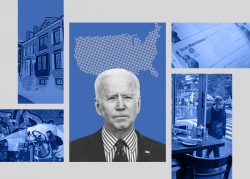President Joe Biden signed the $1.9 trillion stimulus package on Thursday, aggressively expanding federal aid to renters, homeowners, small businesses and more.
“This historic legislation is about rebuilding the backbone of this country,” Biden said before signing the bill, “and giving the people of this nation, working people, the middle-class folks, people who built the country, a fighting chance.”
Biden originally planned to sign the legislation, known as the American Rescue Plan, Friday.
The bill, which touches on issues ranging from health care to child care, has a few impacts on real estate. Here are the five provisions most noteworthy to the industry:
1. Rent and mortgage assistance
The bill includes $21.55 billion for emergency rental assistance, $5 billion for emergency housing vouchers and $100 million for rural housing.
It also provides funds for marginalized communities hurt by the coronavirus pandemic, such as $5 billion to help people experiencing homelessness and $750 million for Native American communities.
2. Small businesses and restaurants
The bill provides $28.6 billion to go to eligible restaurants in grants of up to $5 million.
Restaurant owners are also eligible for a $15 billion Emergency Injury Disaster Loan program, which provides long-term, low-interest loans.
The package appropriates $7.25 billion to the Paycheck Protection Program, which has already disbursed more than $662 billion in forgivable loans.
3. State and local relief
State and local governments are facing pandemic-induced budget shortfalls in the coming months and years, raising concerns among the real estate industry that taxes will be raised.
But the Biden bill designates $350 billion to states, cities, tribal governments and U.S. territories to mitigate the impacts of the coronavirus pandemic.
The bill also adds a $10 billion infrastructure program to help local governments with capital projects.
4. Homelessness
In addition to the $5 billion for people experiencing homelessness, the bill provides $510 million for the FEMA Emergency Food and Shelter Program, which supports homeless services providers. That money may be used for overnight shelter, meals, one month’s rent and mortgage assistance and one month’s utility payments.
5. Stimulus checks
The $1,400 payments that Americans have been awaiting for months is on its way. Individuals making under $75,000 and couples filing jointly making under $150,000 would receive $1,400 per person. The bill also provides $1,400 per dependent.
Smaller checks will go out to individuals making more than $75,000 and couples making more than $150,000, but the benefit phases out at $80,000 and $160,000, respectively.
Meant to boost the economy, the checks make up roughly $400 billion of the package. The previous two stimulus checks have been correlated with increased retail spending, benefiting retailers and, indirectly, their landlords.
Read more



